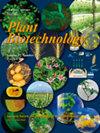Control of plant growth and development by overexpressing MAP3K17, an ABA-inducible MAP3K, in Arabidopsis.
IF 1.4
4区 生物学
Q4 BIOTECHNOLOGY & APPLIED MICROBIOLOGY
引用次数: 11
Abstract
Abscisic acid (ABA) plays an important role in plant growth, development, and stress responses. ABA regulates many aspects of plant growth and development, including seed maturation, dormancy, germination, the transition from vegetative to reproductive growth, leaf senescence and responses to environmental stresses, such as drought, high salinity and cold. It is also known that mitogen-activated protein kinase (MAPK) cascades function in ABA signaling. Recently, we and another group have identified the ABA-inducible MAP3Ks MAP3K17 and MAP3K18 as the upstream MAP3Ks of MKK3, implicating the MAP3K17/18-MKK3-MPK1/2/7/14 cascade in ABA signaling. It has also been reported that overexpression of MAP3K18 in Arabidopsis causes an early leaf senescence phenotype, ABA hypersensitive stomata closing, and drought tolerance. In this study, we generated transgenic plants overexpressing MAP3K17 (35S:MAP3K17) and its kinase-inactive form (35S:MAP3K17KN). The bolting of 35S:MAP3K17 was earlier than WT, and the fresh weights of the seedlings were smaller, whereas 35S:MAP3K17KN showed the opposite phenotype. These results indicate that the transition from vegetative to reproductive growth can be regulated by overexpression of MAP3K17 and its kinase-inactive form. Moreover, 35S:MAP3K17 showed lower sensitivity to ABA during post-germinated growth, whereas 35S:MAP3K17 KN showed the opposite phenotype, suggesting the negative roles of MAP3K17 in the response to ABA. Our work provides the possibility to regulate plant growth and development by the genetic manipulation of ABA-induced MAPK cascades, leading to improved crop growth and productivity.通过在拟南芥中过表达MAP3K17(一种ABA诱导的MAP3K)来控制植物生长和发育。
脱落酸(ABA)在植物生长发育和胁迫反应中起着重要作用。ABA调节植物生长发育的许多方面,包括种子成熟、休眠、发芽、从营养生长到生殖生长的过渡、叶片衰老以及对干旱、高盐度和寒冷等环境胁迫的反应。众所周知,丝裂原活化蛋白激酶(MAPK)级联在ABA信号传导中发挥作用。最近,我们和另一个小组已经确定ABA诱导型MAP3Ks MAP3K17和MAP3K18是MKK3的上游MAP3Ks,涉及ABA信号传导中的MAP3K17/18-MKK3-MPK1/2/7/14级联。据报道,MAP3K18在拟南芥中的过表达导致叶片早衰表型、ABA超敏气孔关闭和耐旱性。在本研究中,我们产生了过表达MAP3K17(35S:MAP3K17)及其激酶非活性形式(35S:MAP3K17KN)的转基因植物。35S:MAP3K17的抽薹早于WT,幼苗的鲜重较小,而35S:MAP3K17KN表现出相反的表型。这些结果表明,从营养生长到生殖生长的转变可以通过过表达MAP3K17及其激酶非活性形式来调节。此外,35S:MAP3K17在发芽后生长过程中对ABA的敏感性较低,而35S:MMAP3K17KN表现出相反的表型,这表明MAP3K17在对ABA的反应中起着负面作用。我们的工作提供了通过ABA诱导的MAPK级联的遗传操作来调节植物生长和发育的可能性,从而提高作物生长和生产力。
本文章由计算机程序翻译,如有差异,请以英文原文为准。
求助全文
约1分钟内获得全文
求助全文
来源期刊

Plant Biotechnology
BIOTECHNOLOGY & APPLIED MICROBIOLOGY-PLANT SCIENCES
CiteScore
2.90
自引率
18.80%
发文量
45
审稿时长
6-12 weeks
期刊介绍:
Plant Biotechnology is an international, open-access, and online journal, published every three months by the Japanese Society for Plant Biotechnology. The journal, first published in 1984 as the predecessor journal, “Plant Tissue Culture Letters” and became its present form in 1997 when the society name was renamed to Japanese Society for Plant Cell and Molecular Biology, publishes findings in the areas from basic- to application research of plant biotechnology. The aim of Plant Biotechnology is to publish original and high-impact papers, in the most rapid turnaround time for reviewing, on the plant biotechnology including tissue culture, production of specialized metabolites, transgenic technology, and genome editing technology, and also on the related research fields including molecular biology, cell biology, genetics, plant breeding, plant physiology and biochemistry, metabolic engineering, synthetic biology, and bioinformatics.
 求助内容:
求助内容: 应助结果提醒方式:
应助结果提醒方式:


